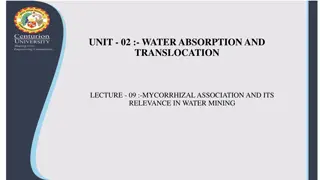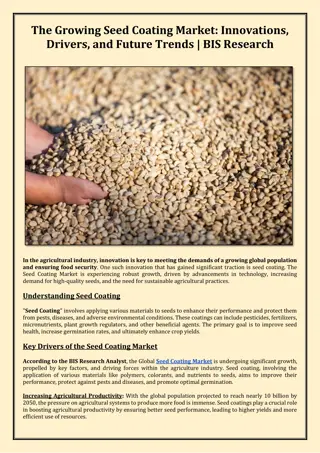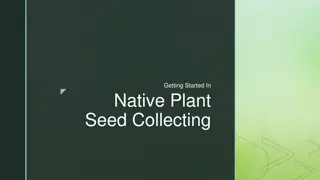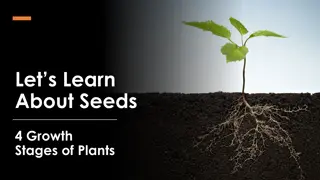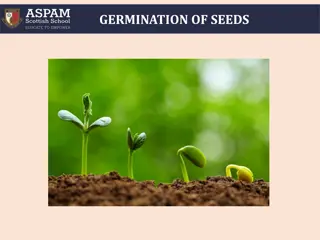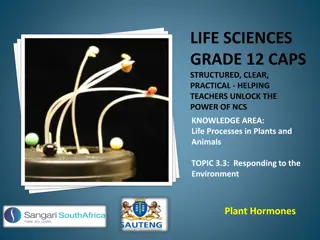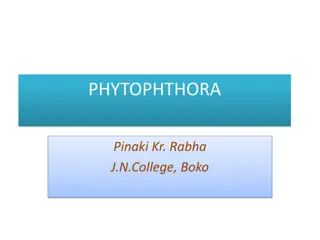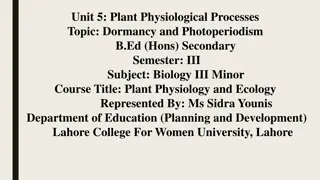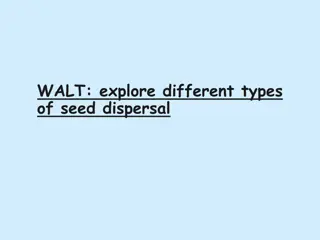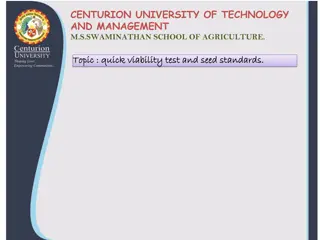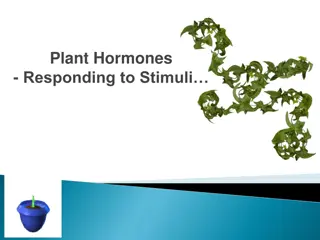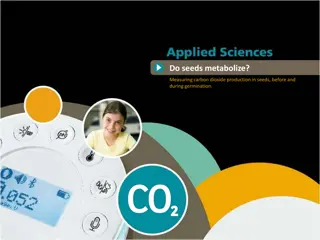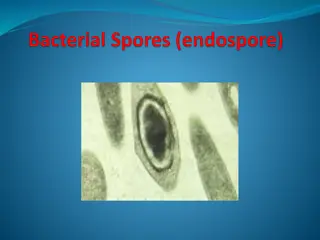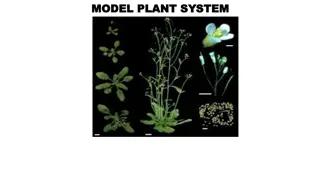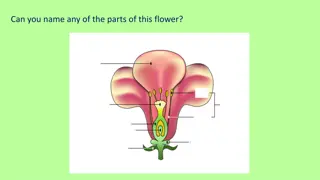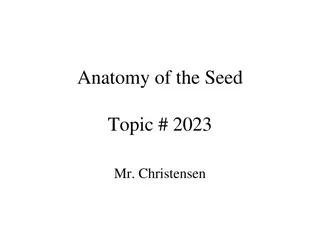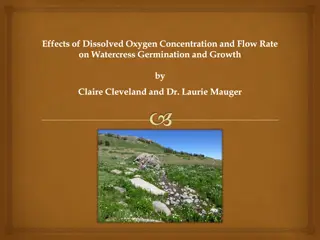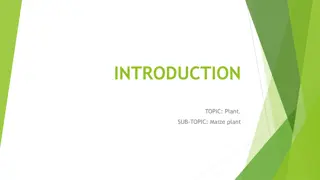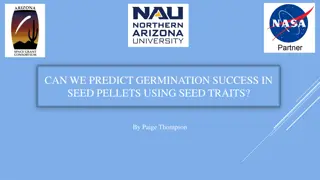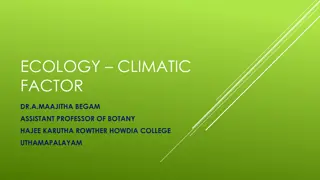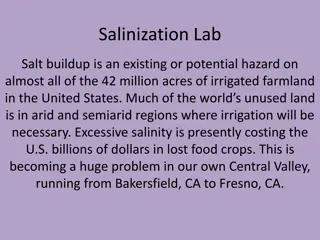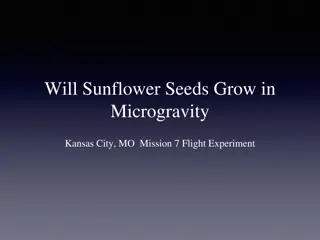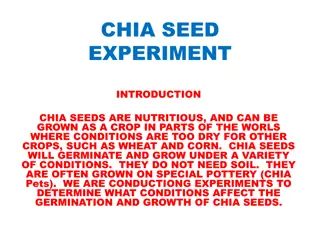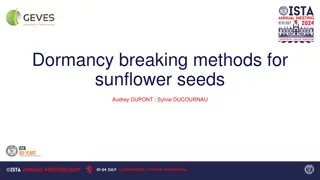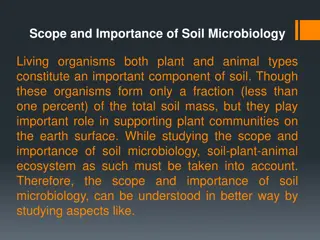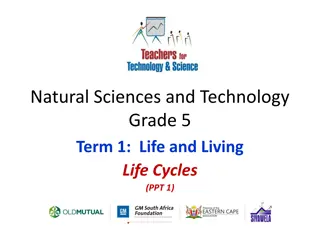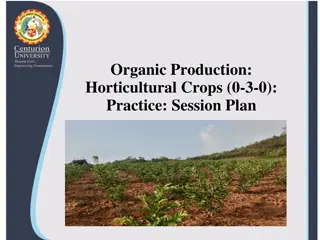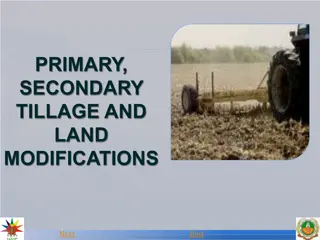Mycorrhizal Association and Its Importance in Water Mining
Mycorrhizal association plays a crucial role in facilitating nutrient and water absorption for plants through a symbiotic relationship with fungi. This relationship enhances the plant's ability to acquire minerals from the soil while providing essential compounds to the fungi. The mycorrhizal associ
4 views • 6 slides
The Growing Seed Coating Market: Innovations, Drivers, and Future Trends
According to the BIS Research Analyst, the Global Seed Coating Market is undergoing significant growth, propelled by key factors, and driving forces within the agriculture industry. Seed coating, involving the application of various materials like polymers, colorants, and nutrients to seeds, aims to
0 views • 3 slides
Native Plant Seed Collection: A Guide to Conservation and Sustainability
Explore the valuable practice of collecting native plant seeds to preserve biodiversity, restore ecosystems, and promote sustainable land management. Learn about seed collection ethics, when to collect seeds, and seed germination methods for various species.
0 views • 15 slides
Understanding the 4 Growth Stages of Plants from Seed to Adult Plant
Explore the fascinating journey of a plant's life cycle through its 4 growth stages: Seed, Germination, Seedling, and Adult Plant. Discover what seeds need to grow and what each stage requires for survival and growth. Engage in a hands-on activity to rearrange the plant growth stages and learn about
0 views • 9 slides
Understanding Bacterial Spores: Structure, Formation, and Germination
Bacterial spores, the highly resistant resting stage of bacteria, are formed in unfavorable conditions. This article explores the structure of a spore, the process of sporulation, and germination stages. Learn about the shape and position of spores, as well as sporicidal agents that are effective ag
0 views • 13 slides
Understanding the Germination Process in Seeds
Explore the fascinating process of seed germination, from identifying seed parts to understanding the factors influencing growth. Delve into activities highlighting the essential components for successful germination, including air, water, warmth, and soil. Unravel the stages of germination and how
1 views • 13 slides
Understanding Plant Hormones and Their Functions in Plants
Plant hormones play crucial roles in various plant processes such as growth, development, and response to environmental stimuli. Auxins, gibberellins, and abscisic acid are key plant hormones that regulate tropisms, cell division, elongation, flowering, seed germination, and dormancy. Understanding
1 views • 50 slides
Understanding Phytophthora: Destructive Plant Pathogen
Phytophthora is a destructive plant pathogen that infects various crops, causing symptoms like leaf lesions and rotting tubers. Its somatic structure includes profusely branched hyphae, and it reproduces asexually through zoospores. The germination process involves the spread of spores by wind and w
1 views • 21 slides
Understanding Seed Dormancy and Ways to Break it
Seed dormancy is a crucial aspect of plant growth, where seeds remain inactive and do not germinate even under favorable conditions. Various reasons contribute to seed dormancy, such as light, temperature, and hard seed coats. Different types of dormancy like innate, enforced, and induced are explai
1 views • 9 slides
Understanding Seed Dispersal in Flowering Plants
Explore the fascinating world of seed dispersal in flowering plants, from wind dispersal to bursting pods and shaking mechanisms. Discover the various methods plants use to spread their seeds and ensure their survival. Dive into the stages of a flowering plant's life cycle and learn how germination,
1 views • 16 slides
Understanding Seed Viability Testing and Standards
Seed viability is crucial for successful germination and plant growth. Various tests like tetrazolium, germination, cut, X-ray analysis, and more are used to assess seed viability. Preconditioning seeds, seed hydration, and seed staining are important steps in the tetrazolium test. Evaluating seeds
0 views • 8 slides
Understanding Plant Hormones and Their Role in Growth and Development
Plant hormones are essential chemicals that enable plants to respond to environmental stimuli, regulate growth processes like cell division and elongation, and control key developmental stages such as flowering and fruit development. Key hormones include auxin, gibberellins, and abscisic acid, each
0 views • 34 slides
Understanding Synchytrium: Causes and Symptoms in Potatoes
Synchytrium is an obligate parasite causing black wart disease in potatoes. It affects underground parts, leading to cauliflower-like outgrowths on tubers. The fungus exhibits a unicellular structure and releases uniflagellate zoospores for asexual reproduction. Germination of prosorus results in th
0 views • 13 slides
Understanding Seed Metabolism: Measuring Carbon Dioxide Production Before and During Germination
Exploring the metabolic processes in seeds, this study aims to compare carbon dioxide production before and during germination. Students will hypothesize and verify using a carbon dioxide SensorLab sensor. Theoretical aspects of plant metabolism, including photosynthesis and cellular respiration, wi
1 views • 22 slides
Understanding Bacterial Endospores and Sporulation Process
Bacterial endospores are dormant structures that allow bacteria to survive harsh conditions. They contain vital genetic material and are resistant to drought, heat, radiation, and chemicals. The process of sporulation involves the formation of endospores within bacterial cells, followed by germinati
0 views • 34 slides
Understanding Plant Developmental Biology and Model Systems
Plant development involves various processes like embryo formation, seed germination, and organ differentiation. Advances in plant developmental biology have led to the study of Arabidopsis as a model system, helping understand plant growth and genetics.
7 views • 13 slides
Understanding Grow-Out Test for Genetic Purity Evaluation in Seed Certification
The Grow-Out Test is a crucial measure in seed certification to determine the genetic purity of seed lots. It helps in controlling genetic contaminations and ensuring compliance with prescribed standards. This test is essential for certain species like cotton, castor, musk melon, and brinjal in Indi
0 views • 16 slides
Explore the Fascinating Life Cycle of Flowering Plants
Discover the various parts of a flower such as petals, stigma, stamen, anther, filament, nectary, sepal, ovary, and ovule. Learn about the role each part plays in plant reproduction by exploring activities on flower anatomy, seed dispersal, pollination, germination, and growth. Engage with interacti
0 views • 7 slides
Understanding Seed Anatomy and Germination Processes
Explore the anatomy of seeds, including taxonomic classes like angiosperms and gymnosperms, subclasses within angiosperms, and components of a seed such as the embryo, endosperm, and seed coat. Learn about seed germination conditions, dormancy, and factors like favorable temperature and scarificatio
0 views • 17 slides
Impact of Dissolved Oxygen and Flow Rate on Watercress Germination and Growth
A study by Claire Cleveland and Dr. Laurie Mauger explores the effects of dissolved oxygen concentration and flow rate on watercress germination and growth. The research includes ecological markers, existing evidence, hypothesis, experimental design, and anecdotal results indicating that watercress
0 views • 15 slides
Understanding Maize Plant Growth and Importance
Maize plants, originally from Mexico, are widely cultivated for their starchy seeds. Learn about the germination process, factors influencing growth, and the significance of growing maize for various products like animal feed, flour, and snacks.
0 views • 8 slides
Enhancing Restoration Success with Seed Pellets: A Study on Predicting Germination in Arid Environments
Ecological restoration in arid lands often faces challenges with seeding projects. This study explores using seed pellets to predict germination success by matching seed traits with pellet characteristics. The hypotheses focus on seed size and species comparison to improve restoration practices.
0 views • 13 slides
Understanding Dormancy in Plants: Causes and Implications
Dormancy in plants, involving seeds and buds, is a state where growth is temporarily halted due to internal or external factors. Factors like immature embryos, impermeable seed coats, and growth inhibitors contribute to seed dormancy. The presence of inhibitors like abscisic acid and the influence o
0 views • 43 slides
Ecological Factors and Climatic Influences on Plant Life
Ecological factors play a crucial role in shaping the environment for organisms to thrive. This includes living (biotic) and non-living (abiotic) components like climatic factors, edaphic factors, topographic factors, and biotic factors. Climatic factors such as light, temperature, water, wind, and
0 views • 14 slides
Understanding the Impact of Salinization on Agriculture and Water Resources
Salinization poses a significant threat to agriculture, especially in areas like the Central Valley, leading to lost food crops and economic repercussions. The intrusion of saltwater into aquifers due to excessive irrigation contributes to the problem. Research and lab studies focus on the effects o
0 views • 9 slides
Sunflower Seeds Germination Experiment in Microgravity
This experiment aims to test whether sunflower seeds can germinate in microgravity conditions. The project involves students from Crossroads Academy of Kansas City and explores the potential of growing sunflowers in space for their nutritional benefits. By examining the germination process in a cont
0 views • 8 slides
Chia Seed Experiment: Investigating Germination and Growth Factors
Chia seeds are nutritious and versatile crops that can thrive in dry conditions. This experiment aims to explore factors influencing the germination and growth of chia seeds. The hypothesis, procedures, and control groups are detailed to guide the experiment, which involves testing the impact of wat
0 views • 8 slides
Understanding Seed Metabolism: Measuring Carbon Dioxide Production Before and During Germination
This study explores the metabolic processes of seeds by comparing carbon dioxide production before and during germination. Students formulate hypotheses and verify them using a carbon dioxide Labdisc sensor. The introduction delves into common metabolic processes in plants and animals, with a focus
0 views • 22 slides
Efficient Methods for Breaking Dormancy in Sunflower Seeds: A Study Update
Seed dormancy in sunflowers post-harvest presents challenges, with conventional methods like pre-chilling and pre-heating often inadequate. A recent study in France explored the use of Ethrel treatment as a more effective approach to overcome seed dormancy in sunflower seeds. Preliminary results sug
0 views • 6 slides
Understanding the Scope and Importance of Soil Microbiology in Ecosystems
Soil microbiology plays a significant role in supporting plant communities and maintaining soil health. Living organisms, both plant and animal types, form only a small fraction of soil mass but are crucial for processes like plant growth, organic matter decomposition, humus formation, and biogeoche
0 views • 14 slides
Understanding Flower Dissection and Reproduction Process
Angiosperms are seed-bearing plants that produce flowers containing essential and accessory organs for reproductive functions. The stamen and pistil play key roles in the male and female reproductive processes, leading to fertilization and seed formation. Pollination, germination, and fruit developm
0 views • 14 slides
Understanding Life Cycles: Plants and Animals
Explore the fascinating world of life cycles in plants and animals through engaging visuals and descriptions. From the process of germination to the different stages of growth and development, discover how living organisms move through their life cycles. Topics include plant pollination, seed disper
0 views • 14 slides
Organic Seed Treatment Techniques for Improved Horticultural Crop Production
Explore the benefits of organic seed treatment methods for horticultural crops, such as priming, pelleting, and seed health treatments. Learn how these techniques can enhance germination rates, protect against pathogens, and optimize planting accuracy in organic farming practices.
0 views • 14 slides
Importance of Primary and Secondary Tillage in Crop Production
Tillage is a crucial operation in crop production involving primary and secondary stages. Primary tillage, such as ploughing, helps open compacted soil and uproot weeds, while secondary tillage refines the soil for better germination and growth. Various implements like ploughs, disc harrows, and cul
0 views • 34 slides
